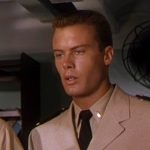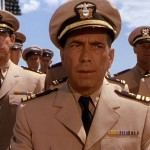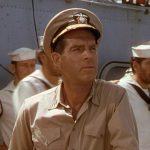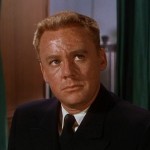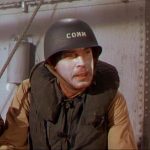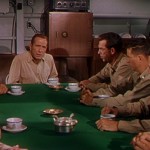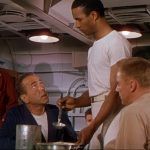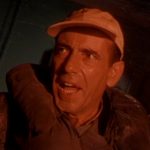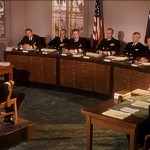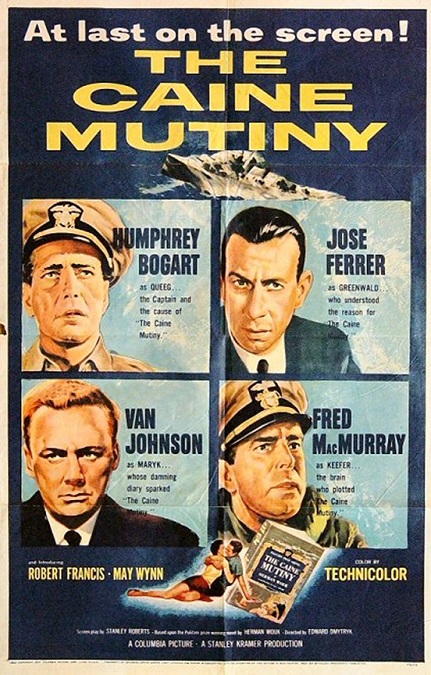
The Caine Mutiny – 1954
Not bad. Not bad at all. The story was compelling and complex, and I was pleased that it was not just about the mutiny, but about the reasons behind it and the legal consequences that the officers involved had to deal with. The big question that the viewer is left with at the end of the film was: who was really to blame for the mutiny?
The film’s lead character, I believe, was Ensign Willie Keith, played by a young inexperienced actor named Robert Francis, because the whole thing seemed to be told from his perspective. I say he was inexperienced because this was the first of his four major film roles. Because of The Caine Mutiny’s success, Columbia Pictures was lining Francis up to be the next big Hollywood star. Unfortunately, his career was tragically cut short when he was killed in a plane crash in 1955.
Ensign Keith is an officer in the U.S. Navy, assigned to the battle-scarred destroyer-minesweeper, the Caine. He is disappointed in the dilapidated state of the ship’s condition, its crew, and its commanding officer, Lieutenant Commander DeVriess, played by Tom Tully. But he is determined to do his duty.
Keith is pleased when Devriess is replaced by Lieutenant Commander Philip Queeg, played by Bogart. Queeg’s by-the-book attitude and style of command seems to be just what the lackadaisical ship needs. But Queeg begins to show signs of instability when his orders cause damage to the ship, for which he refuses to take responsibility. He obsesses over details which, on the surface, seem inconsequential. He ignores the advice of his officers and considers them to be insubordinate.
Most notable of the other officers under his command are Lieutenant Steve Maryk, wonderfully played by Van Johnson, and Lieutenant Tom Keefer, played by Fred MacMurray. They, along with Ensign Kieth, notice Queeg’s irrational behavior. Keefer’s character was a writer and a self-proclaimed expert on human behavior. It was he who first broached the subject of Queeg’s unfitness to command.
Van Johnson’s performance was subtle, but so well done. He created a character that had complexity and depth, though there was no apparent back-story for him to work with. I really enjoyed his performance. MacMurray, played a character that I originally thought was unusual for him, a man who instigated a mutiny, a coward, and a liar when it came time to defend the men who carried the mutiny out. But as I am getting to know his career apart from his famously wholesome TV role of Steve Douglas on My Three Sons, I am realizing that he often played questionable characters. He was a murderer in Double Indemnity and a philanderer in The Apartment.
But it was Bogart who really made the film shine. His performance as the mentally unstable commander was perfectly played. It could have so easily been over-the top or even ridiculous, but it wasn’t. It was believable. Queeg was mentally stable and capable, on the surface, but paranoid and incompetent underneath. There is a scene in which the disappearance of some strawberries, a minor issue of petty theft, is turned into a major, ship-wide manhunt. Bogart’s performance was incredible as he allowed the crazy to brush against the thin veil separating his paranoia from the outside world. Brilliant!
But what I liked about the film was the ending. OK, so Queeg’s incompetence nearly sinks the ship during a typhoon and Lt. Maryk relieves him of duty to save the lives of its crew. The following trial proves that Queeg was mentally unstable, and Maryk is acquitted. But his lawyer, Lieutenant Greenwald, played by Jose Ferrer, hits the nail on the head, saying that the mutiny might never have been necessary if the crew had given Queeg the support that he needed when he had asked for it, and shame on the men for not giving it to him. But I have to wonder: Would Queeg have listened to their advice if they had? He had never listened to them before.
